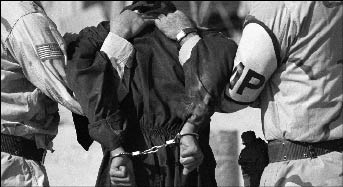Pictures at an Extradition
by George Sax

At several intervals in Mat Whitecross and Michael Winterbottom’s film about the US government’s confinement of three young Pakistani-Englishmen at the Guantanamo, Cuba prison facility for alleged “enemy combatants,” the brute stupidity of the American captors threatens to seriously challenge their common brutality as the dominant characteristic in their treatment of the prisoners. In one scene, a civilian interrogator begins to question one of them with the assistance of an Arabic-speaking interpreter. For a few moments the young detainee from outside Birmingham, England responds in Arabic, but he eventually startles this intelligence specialist by asking in English why they’re doing this. “You speak English?” she asks, nonplussed.
Despite this 2006 movie’s evidence of American cluelessness, brutality wins. It’s no contest.
The movie’s three subjects came from England to Pakistan in the first week of October 2001 to attend the arranged wedding of one of them. According to their explanations, after some sightseeing in Quetta they impulsively decided to take a sidetrip across the border into Afghanistan, curious about the increasingly tense post-9/11 circumstances. Stranded there when the American war against Afghanistan’s al Qaeda-sheltering Taliban regime began, they were turned over to US forces by Afghan allies and flown to Cuba, where they were held for about 26 months, often in vile conditions. They were persistently abused, psychologically and physically.
The filmmakers tell the young men’s version of events through a combination of talking-head personal testimony, intercut news videos and, most notably, dramatizations of events, with actors portraying both the prisoners and the American personnel. This makes for a sometimes unwieldy but surprisingly effective hybrid.
The movie evinces no effort at balance, but questions of bias are really rather beside the point. In finally releasing the three men (after pressure from the British government, although the film doesn’t note this fact) the American authorities effectively conceded their errors, without ever acknowledging them.
Road to Guantanamo is a vividly convincing depiction of its subjects’ experiences. It offers a narrowly but intensely focused insight into the sometimes surreally terroristic extra-legal regime our government has established, ostensibly to fight terrorism.
|
Issue Navigation> Issue Index > v5n43: The Halloween Issue (10/26/06) > Pictures at an Extradition This Week's Issue • Artvoice Daily • Artvoice TV • Events Calendar • Classifieds |









 Current Issue
Current Issue